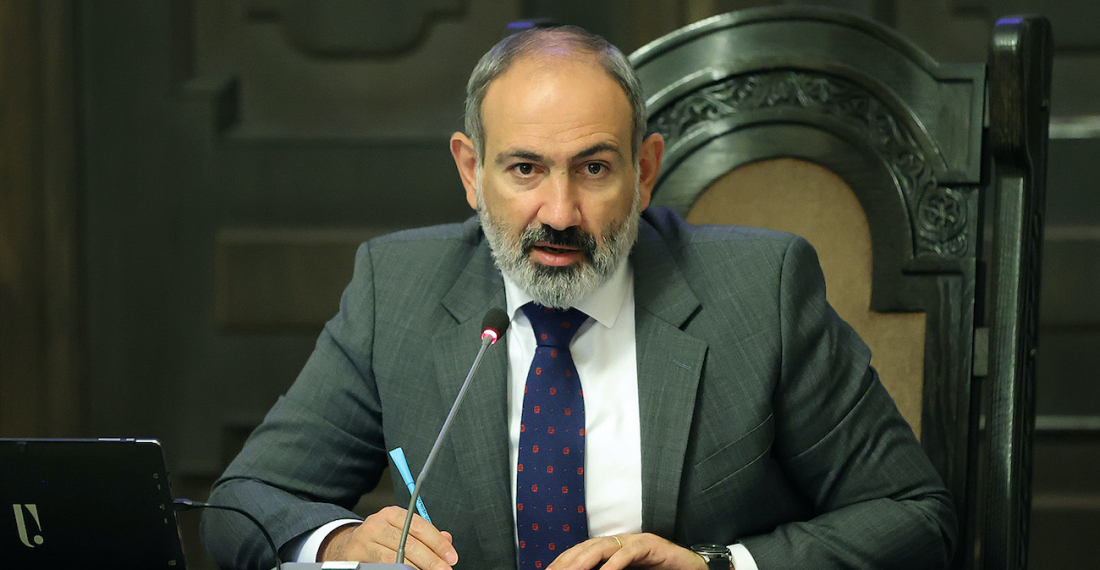In what appeared to be a direct response to a speech delivered a day earlier by the Azerbaijani president, the Armenian prime minister, Nikol Pashinyan, on Thursday (15 July) set out the Armenian position on a number of issues related to future peace in the region. Pashinyan said that Armenia was ready to resume the Karabakh peace process in the format outlined in the OSCE Minsk Group Co-Chairs' statement. He also said that Azerbaijan was making statements about the [Zangazur] corridor in order to distort the activities of the trilateral working group and prevent the opening of regional communications because its goal was to continue the thirty-year blockade of Armenia.
Speaking at a regular government session in Yerevan, Pashinyan said that Azerbaijan was trying to create the impression that Armenia is against peace and the peace treaty. “Meanwhile, Armenia has several times publicly welcomed the April 13 statement of the OSCE Minsk Group Co-Chairs, which, in particular, reads, and I quote: ‘Taking into account the terms of the OSCE mandate and the aspirations of all the people of the region for a stable, peaceful and prosperous future, the Co-Chairs stress that special attention should be paid to a final comprehensive, lasting settlement based on principles well known to the parties. In this regard, they ‘call on the parties to resume high-level political dialogue under the auspices of the Co-Chairs at the earliest opportunity. The Co-Chairs reiterate their offer to hold direct bilateral consultations so that the parties can jointly review and agree on a structural agenda outlining their priorities without preconditions’.” Pashinyan reminded that the principles well known to the parties, which are mentioned in this statement and are the basis of the settlement of the Karabakh conflict, are three: self-determination of peoples, exclusion of the use of force or threat of force, and territorial integrity.
"This statement by the Co-Chairs is thus nothing more than a proposal for a roadmap for peace in the region. Armenia welcomed this statement and responded positively to the provisions set out in it. I would like to state once again that Armenia is ready to resume the Karabakh peace process in the format outlined in the Co-Chairs' statement. And I think that the Azerbaijani leadership would do well to heed the mediators' urgings instead of destructive actions and statements, and also take a clear position on the statement of the well-known co-chairs. It is clear that we will diligently pursue the realisation of the right of the people of Artsakh to self-determination".
The semi-official Armenpress news agency quoted the Armenian prime minister as saying that as a result of the 2021 snap parliamentary elections, the Civil Contract party had received a mandate for opening an era of peaceful development for Armenia and Artsakh. This mandate supposes creating a favourable atmosphere across Armenia, opening regional communications, and establishing regional peace and stability.
“However, after the elections what we have expected has taken place and is taking place, and there is high probability that Azerbaijan will do everything to undermine peace in the region and it will do this with a strategy which is also predictable, trying to show that Armenia or Artsakh allegedly oppose peace, demarcation and delimitation processes and they will create fake grounds for building an aggressive policy, as we see in the past days”, Armenpress quoted the prime minister as saying.
Pashinyan added that the Russia-Armenia-Azerbaijan deputy-prime-ministerial working group carries out quite constructive and productive work for unblocking the regional communications, and Azerbaijan’s statements about the so-called “Zangazur corridor” have no connection with the work of this group and the content of the 11 January trilateral statement signed in Moscow.
“Azerbaijan is making statements about corridor in order to distort the activities of the trilateral working group and not allow the opening of regional communications because its goal is to continue the policy of the 30-year-old process of blockading Armenia. But we will continue the work in the trilateral working group to break the blockade of Armenia and will achieve the opening of regional communications with the support of Russia and our international partners”, Pashinyan said. According to the Armenian prime minister, Azerbaijan opposes the border demarcation and delimitation work because it brought fake maps, trying to justify the presence of its troops in several parts of Armenia’s sovereign territory. Pashinyan said Armenia will defend its sovereignty and territorial integrity with all possible means, including with the use of the Armenian-Russian joint forces and the CSTO mechanisms.



